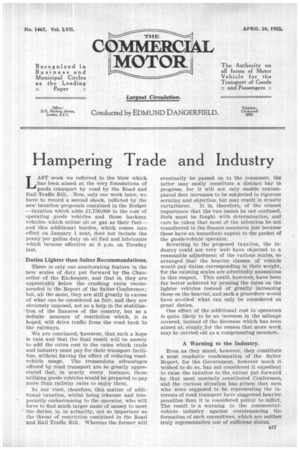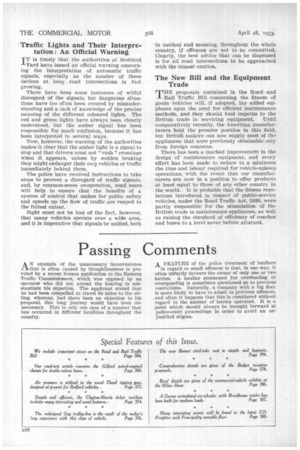Hampering Trade and Industry
Page 35

Page 36

If you've noticed an error in this article please click here to report it so we can fix it.
LAST week we referred to the blow which has been aimed at the very foundations of goods transport by road by the Road and Rail Traffic Bill., Now, only one week later, we have to record a second shock, inflicted by the new taxation proposals contained in the Budget —taxation which adds 11,750,000 to the cost of operating goods vehicles and those hackney vehicles which utilize oil or gas as their fuel-and this additional burden, which comes into effect on January 1 next, does not include the penny per gallon duty on oil fuel and lubricants which became effective at 6 p.m. on Tuesday last.
Duties Lighter than Salter Recommendations.
There is only one ameliorating feature in the new scales of duty put forward by the Chancellor of the Exchequer, and that is, they are appreciably below the crushing rates recommended in the Report of the Salter Conference ; but, all the same, they are still greatly in excess of what can be considered as fair, and they are obviously imposed, not as a help in the stabilization of the finances of the country, but as a definite measure of restriction which, it is hoped, will drive traffic from the road back 'to the railways.
We are convinced, however, that such a hope is vain and that the final result will be merely to add the extra cost to the rates which trade and industry must pay for their transport facilities, without having the effect of reducing roadvehicle usage. The tremendous advantages offered by road transport, are so greatly appreciated that, in nearly every, instance, those utilizing goods vehicles would be prepared to pay more than railway rates to enjoy them.
in our view, therefore, this matter of additional taxation, whilst being irksome and temporarily embarrassing to the operator, who will have to find much larger sums of money to meet the duties, is, in actuality, not so important as the threat of restriction contained in the Road 'and Rail Traffic Bill, Whereas the former will eventually be passed on to the consumer, the latter may easily constitute a distinct bar to progress, for it will not only enable contemplated fleet increases to be subjected to rigorous scrutiny and objection, but may result in drastic curtailment. It is, therefore, of the utmost importance that the two issues be not confused. Both must be fought with determination, and care be taken that most of the attention be not transferred to the finance measures just because these have an immediate appeal to the pocket of the goods-vehicle operator.
Reverting to the proposed taxation, the industry could not very well have objected to a reasonable adjustment of the various scales, so arranged that the heavier classes of vehicle would pay duties corresponding to their weight, for the existing scales are admittedly anomalous in this respect. This could, however, have been far better achieved by pruning the rates on the lighter vehicles instead of greatly increasing those on the heavier, and such a procedure would have avoided what can only be considered as penal duties.
One effect of the additional cost to operators is quite likely to be an increase in the mileage covered. instead of the decrease which has been aimed at, simply.for the reason that more work may be carried out as a compensating measure.
A Warning to the Industry.
Even as they stand, however, they constitute a most emphatic condemnation of the Salter Report, for the Government, however much it, wished to do so, has not considered it expedient to raise the taxation to the extent put forward by that most unwisely constituted Conference, and the curious situation has arisen that men who were supposed to be representing the interests of road transport haVe suggested heavier penalties than it is considered politic to inflict. The result is a warning to the commercialvehicle, industry against countenancing the formation of such committees, which are neither truly representative nor of sufficient status.
Traffic Lights and Their Interpretation: An Official Warning
TT is timely that the authorities at Scotland 'Yard have issued an official warning concerning the interpretation of automatic traffic signals, especially as the number of these devices at busy road intersections is fast growing.
There have been some instances of wilful disregard of the signals, but dangerous situations have too often been created by misunderstanding and a lack of knowledge of the precise meaning of the different coloured lights. The red and green lights have always been clearly understood, but the amber signal has been responsible for much confusion, because it has been interpreted in several ways. Now, however, the warning of the authorities makes it clear that the amber light is a signal to stop and that drivers must not " rush " crossings when it appears, unless by sudden braking they might endanger their ow u vehicles or traffic immediately behind them. The police have received instructions to take steps to prevent a disregard of traffic signals, and, by common-sense co-operation, road users will help to ensure that the benefits of a system of control that makes for public safety and speeds up the flow of traffic are reaped to the fullest extent.
Sight must not be lost of the fact, however, that many vehicles operate over a wide area, and it is imperative that signals be unified, both in method and meaning, throughout the whole country, if offences are not to be committed. Clearly, the best advice that can be dispensed is for all road intersections to be approached with the utmost caution.
The New Bill and the Equipment Trade
THE proposals contained in the Road and Rail Traffic Bill concerning the fitness of goods vehicles will, if adopted, lay added emphasis upon the need for efficient maintenance methods, and they should lend impetus to the British trade in servicing equipment. Until comparatively recently, the American manufac• turers held the premier position in this field, but British makers can now supply most of the appliances that were previously obtainable only from foreign concerns. There has been a marked improvemefit in the design of maintenance equipment, and every effort has been made to reduce to a minimum the time and labour required for vehicle-upkeep operations, with the result that our manufacturers are now in a position to offer product.; at least equal to those of any other country in the world. It is probable that the fitness regulations introduced in respect of public-service vehicles, under the Road Traffic Act, 1930, were partly responsible for the stimulation of the British trade in maintenance appliances, as well as raising the standard of efficiency of coaches and buses to a level never before attained.




































































































